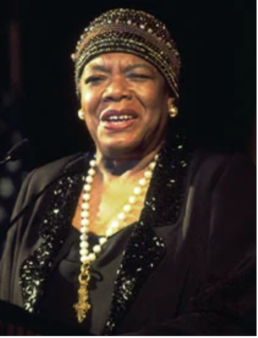These life stories may contain descriptions of childhood trauma and abuse, as well as images, voices and names of people now deceased. If you need help, you can find contact details for some relevant support services on our support page.
Iconic African American writer, Maya Angelou (1928-2014), was in kinship care as a child.
Marguerite Ann Johnson was born in St Louis, Missouri. When her parent’s marriage collapsed, three-year-old Maya – her brother’s nickname for her – and her older brother, Bailey, were put on a train to Arkansas and their paternal grandmother, Annie Henderson.
The children returned to their parents four years later. While living with her mother, the seven-year-old girl was raped by her mother’s partner. Freeman was convicted but was only jailed for one day. Shortly after his release from prison, Freeman was murdered.
Maya stopped speaking after the trauma, believing that it was talking about the rape that got Freeman killed.
The children were returned to their grandmother, this time until Maya was fourteen. While living with her grandmother, Maya was introduced by Mrs Bertha Flowers to literary greats such as Charles Dickes and Edgar Allan Poe as well as significant Black writers including Langston Hughes and WEB Du Bois; Mrs Flowers encouraged the child to speak again by talking about literature.
Before finishing high school education, Maya became the first Black female streetcar conductor in San Francisco.
After graduation, Angelou undertook a series of odd jobs to support herself and her son [Clyde Bailey Johnson]. In 1949, she married Tosh Angelos, an electrician in the US Navy. She adopted a form of his surname and kept it throughout her life, though the marriage ended in divorce in 1952 (Spring).
Angelou joined the Harlem Writers Guild in 1959 where she met James Baldwin and became active in the Civil Rights Movement, working for Martin Luther King and for Malcolm X.
She published the first of seven memoirs, Why the Caged Bird Sings, in 1969. The book is one of the most widely read memoirs of the second half of the 20th century and is credited with encouraging other abuse survivors to speak out.
Also an actor, director, and producer, Maya Angelou was the first African American woman to have a screenplay – Georgia, Georgia – adapted for film. She received a Tony nomination in 1973 for her role in Look Away, played Kunta Kinte’s grandmother in Roots in 1977, and contributed to the adaptation for television of Why the Caged Bird Sings in 1979. Angelou returned to the screen during the 1990s, including appearing on both Sesame Street and in How to Make an American Quilt in 1995.
Angelou began teaching at Wake Forest University, Winston-Salem, North Carolina in 1973 and became the university’s first Reynolds Professor of American Studies in 1982. The university awarded Angelou an honorary doctorate in 1977 (Smith College and Mills College had both awarded Angelou honorary degrees in 1975) and the Wake Forest School of Medicine established The Maya Angelou Center for Health Equity in 2002.
Maya Angelou has written numerous books, including children’s books, autobiographies, essays, and poetry.
Angelou’s poetry often benefited from her performance of it, and during her lifetime Angelou recited her poems before spellbound crowds. Indeed, Angelou’s poetry can also be traced to African-American oral traditions like slave and worksongs, especially in her use of personal narrative and emphasis on individual responses to hardship, oppression and loss (Poetry Foundation).
Maya Angelou has received numerous honorary doctorates and many awards, including the Presidential Medal of Freedom awarded by Barack Obama in 2010, and in 2022 she was selected to feature on a coin, a quarter, as part of a series honouring notable American women. Maya Angelou is the first Black woman to be displayed on US currency.
References:
Maya Angelou. https://mayaangelou.com/
“Maya Angelou.” Biography, 2021. https://www.biography.com/writer/maya-angelou
“Maya Angelou 1928-2014.” Poetry Foundation. https://www.poetryfoundation.org/poets/maya-angelou
“Remembering Maya Angelou: Teacher.” Wake Forest University, 2014. https://mayaangelou.wfu.edu/story/
Spring, Kelly. “Maya Angelou (1928-2014).” National Women’s History Museum, 2021. https://www.womenshistory.org/education-resources/biographies/maya-angelou
Image available here.
